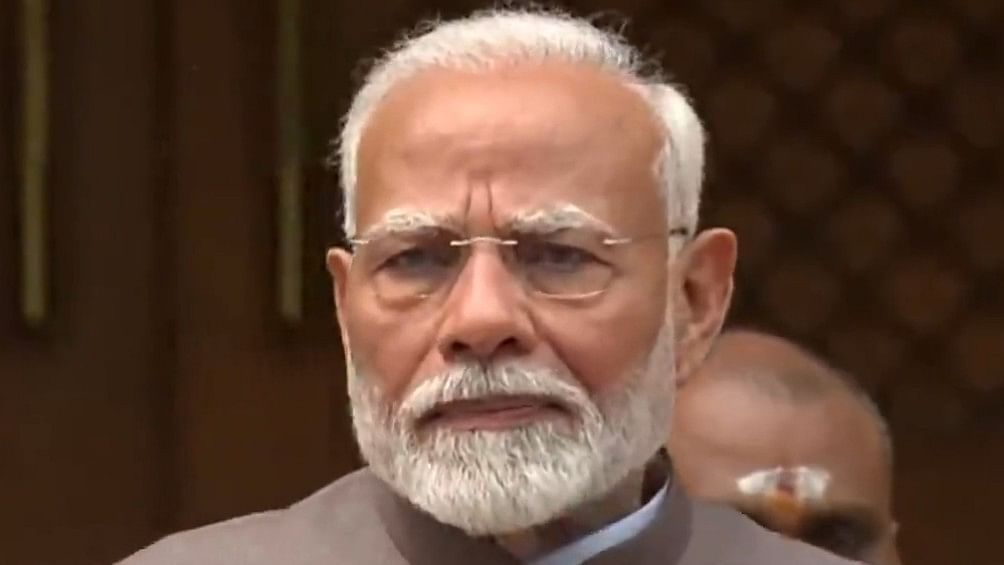
PM Narendra Modi.
Credit: X/@narendramodi
By Diksha Madhok and Preeti Soni
Prime Minister Narendra Modi will find it increasingly difficult to distance himself from the latest controversy erupting around Gautam Adani, one of the world’s richest businessmen who’s widely seen as having close ties with the Indian leader.
Hours after US prosecutors charged Adani with helping direct a massive bribery scheme, opposition leaders in India renewed their questioning of Modi’s relationship with the billionaire, whose business empire has expanded in tandem with the prime minister’s decade in power.
Rahul Gandhi, Modi’s main political rival, challenged the prime minister to arrest Adani and said he’ll use his expanded powers in parliament to investigate the tycoon’s businesses.
“It’s now pretty clear and established in America that Mr. Adani has broken both American and Indian laws,” Gandhi told reporters in New Delhi on Thursday. “I’m wondering why Mr. Adani is still roaming free in this country,” he said, suggesting that Modi’s close links with Adani shield him from being questioned over corruption charges.
Modi is currently out of the country, making his way back to India from the Group of 20 summit in Brazil earlier this week. His office didn’t immediately respond to requests for comment. India’s Ministry of External Affairs earlier declined to comment on the Adani allegations. A spokesperson for Modi’s Bharatiya Janata Party told reporters Thursday that “it is for the company to give clarification and defend itself. Law will take its own course.”
Modi and the BJP largely stayed mute when the Adani Group faced a barrage of accusations of wrongdoing by US short-seller Hindenburg Research, which wiped over $150 billion of the group’s combined market value at one point. But after national elections earlier this year, Modi will confront an emboldened opposition ready to wield the controversy to permanently damage the Indian leader’s reputation, analysts said.
“This puts Modi in an awkward position — he projects himself as an incorruptible leader, but his friendship with Adani is an open secret,” said Michael Kugelman, director of the South Asia Institute at the Wilson Center in Washington. “For Modi, the biggest challenges will be fending off the opposition, and carefully balancing his political image as a non-corrupt leader with his long friendship with Adani.”
Even with the opposition’s threats, Modi’s government is unlikely to be threatened. The BJP’s coalition partners have so far refrained from commenting on the charges, an indication of the wide support Adani enjoys in the South Asian nation.
US prosecutors alleged on Wednesday that Adani and other defendants promised to pay more than $250 million in bribes to Indian government officials to win solar energy contracts, and concealed the plan as they sought to raise money from American investors. The Adani Group on Thursday denied the allegations and said it would seek legal recourse.
The indictment comes at a sensitive time for Modi. His BJP had its weakest showing in a decade in elections that ended in June, resulting in the party losing its majority in parliament and being forced to rely on coalition partners to govern. The Congress party and its allies more than doubled their seats.
The BJP’s support was also tested in crucial state elections this week. Results for Maharashtra, home of the financial hub of Mumbai, where Adani’s businesses have pumped billions of dollars of investment, are due to be released on Saturday. Exit polls show the BJP leading by only a small margin. A defeat for Modi, 74, would be yet another signal that his once-ironclad grip on the world’s most populous nation is weakening.
“BJP is not BJP alone in power — its allies, partners are also there,” said Amit Ranjan, a research fellow at the Institute of South Asian Studies at the National University of Singapore.
Gujarat Ties
While Modi has stayed silent on his ties to Adani, 62, the two men are believed to be close. Both men hail from the western state of Gujarat and the billionaire has aligned his business plans with the prime minister’s growth strategy for India. The Adani Group is involved in key infrastructure projects across the country, from harbors to airports, and employs tens of thousands of people.
Modi “has a strong political incentive to distance himself from Adani. But given Adani’s massive commercial clout, Modi can’t afford to push him away, either,” said Kugelman.
After the bombshell Hindenburg report in January last year, in which Adani was accused of stock market manipulation and accounting fraud, India’s fragmented opposition mounted an attack on the ruling party, demanding a parliamentary investigation. They are on even firmer footing this time, said Ranjan.
“It is not going to be very easy for the prime minister,” he said. “Politically it’s a scoring point for Rahul Gandhi and others who were against Gautam Adani for a long time.”
Scrutiny in Parliament
Gandhi said Thursday that the alliance of opposition parties in the country will take up the matter up in parliament next week. He called for a joint parliamentary committee to scrutinize Adani’s businesses and asked authorities to arrest the tycoon.
Still, it won’t be easy to initiate a probe against Adani. The infrastructure mogul has made substantial investments across the country, including in states that are not governed by the BJP or its allies. An investigation by a parliamentary committee may not also result in any punitive action.
The Aam Aadmi Party, a key opposition party that governs New Delhi, said on X that the US bribery probe had “exposed” the “Modi-Adani nexus” once again. The Communist Party of India (Marxist) called for an investigation by federal agencies.
“The Modi government cannot hide behind any smokescreen now,” the party said in a statement. “The Central Bureau of Investigation must be directed to immediately file a case based on the material provided by the prosecution in the United States.”